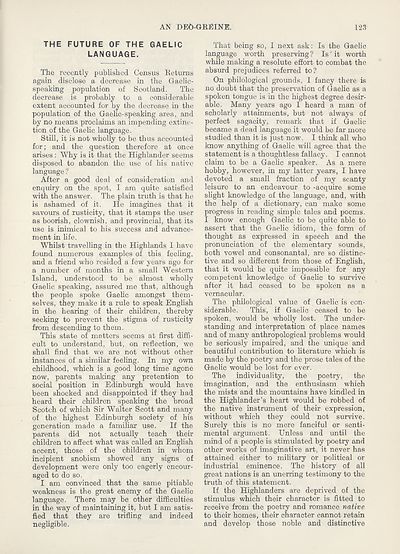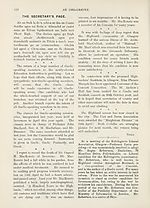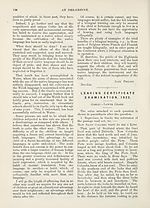An Comunn Gàidhealach Publications > Deo-gréine > Volume 17, October 1921 to September 1922
(131) Page 123
Download files
Complete book:
Individual page:
Thumbnail gallery: Grid view | List view

AN DEO-GREINE.
123
THE FUTURE OF THE GAELIC
LANGUAGE.
The recently published Census Returns
again disclose a decrease in the Gaelic¬
speaking population of Scotland. The
decrease is probably to a considerable
extent accounted for by the decrease in the
population of the Gaelic-speaking area, and
by no means proclaims an impending extinc¬
tion of the Gaelic language.
Still, it is not wholly to be thus accounted
for; and the question therefore at once
arises : Why is it that the Highlander seems
disposed to abandon the use of his native
language ?
After a good deal of consideration and
enquiry on the spot, I am quite satisfied
with the answer. The plain truth is that he
is ashamed of it. He imagines that it
savours of rusticity, that it stamps the user
as boorish, clownish, and provincial, that its
use is inimical to his success and advance¬
ment in life.
Whilst travelling in the Highlands 1 have
found numerous examples of this feeling,
and a friend who resided a few years ago for
a number of months in a small Western
Island, understood to be almost wholly
Gaelic speaking, assured me that, although
the people spoke Gaelic amongst them¬
selves, they make it a rule to speak English
in the hearing of their children, thereby
seeking to prevent the stigma of rusticity
from descending to them.
This state of matters seems at first diffi¬
cult to understand, but, on reflection, we
shall find that we are not without other
instances of a similar feeling. In my own
childhood, which is a good long time agone
now, parents making any pretention to
social position in Edinburgh would have
been shocked and disappointed if they had
heard their children speaking the broad
Scotch of which Sir Walter Scott and many
of the highest Edinburgh society of his
generation made a familiar use. If the
parents did not actually teach their
children to affect what was called an English
accent, those of the children in whom
incipient snobism showed any signs of
development were only too eagerly encour¬
aged to do so.
I am convinced that thei same pitiable
weakness is the great enemy of the Gaelic
language. There may be other difficulties
in the way of maintaining it, but I am satis¬
fied that they are trifling and indeed
negligible.
That being so, I next ask: Is the Gaelic
language worth preserving ? Is' it worth
while making a resolute effort to combat the
absurd prejudices referred to?
On philological grounds, I fancy there is
no doubt that the preservation of Gaelic as a
spoken tongue is in the highest degree desir¬
able. Many years ago I heard a man of
scholarly attainments, but not always of
perfect sagacity, remark that if Gaelic
became a dead language it would be far more
studied than it is just now. I think all who
know anything of Gaelic will agree that the
statement is a thoughtless fallacy. I cannot
claim to be a Gaelic speaker. As a mere
hobby, however, in my latter years, I have
devoted a small fraction of my scanty
leisure to an endeavour to -acquire some
slight knowledge of the language, and, with
the help of a dictionary, can make some
progress in reading simple tales and poems.
I know enough Gaelic to be quite able to
assert that the Gaelic idiom, the form of
thought as expressed in speech and the
pronunciation of the elementary sounds,
both vowel and consonantal, are so distinc¬
tive and so different from those of English,
that it would be quite impossible for any
competent knowledge of Gaelic to survive
after it had ceased to be spoken as a
vernacular.
The philological value of Gaelic is con¬
siderable. This, if Gaelic ceased to be
spoken, would be wholly lost. The under¬
standing and interpretation of place names
and of many anthropological problems would
be seriously impaired, and the unique and
beautiful contribution to literature which is
made by the poetry and the prose tales of the
Gaelic would be lost for ever.
The individuality, the poetry, the
imagination, and the enthusiasm which
the mists and the mountains have kindled in
the Highlander’s heart would be robbed of
the native instrument of their expression,
without which they could not survive.
Surely this is no mere fanciful or senti¬
mental argument. Unless and until the
mind of a people is stimulated by poetry and
other works of imaginative art, it never has
attained either to military or political or
industrial eminence. The history of all
great nations is an unerring testimony to the
truth of this statement.
If the Highlanders are deprived of the
stimulus which their character is fitted to
receive from the poetry and romance native
to their homes, their character cannot retain
and develop those noble and distinctive
123
THE FUTURE OF THE GAELIC
LANGUAGE.
The recently published Census Returns
again disclose a decrease in the Gaelic¬
speaking population of Scotland. The
decrease is probably to a considerable
extent accounted for by the decrease in the
population of the Gaelic-speaking area, and
by no means proclaims an impending extinc¬
tion of the Gaelic language.
Still, it is not wholly to be thus accounted
for; and the question therefore at once
arises : Why is it that the Highlander seems
disposed to abandon the use of his native
language ?
After a good deal of consideration and
enquiry on the spot, I am quite satisfied
with the answer. The plain truth is that he
is ashamed of it. He imagines that it
savours of rusticity, that it stamps the user
as boorish, clownish, and provincial, that its
use is inimical to his success and advance¬
ment in life.
Whilst travelling in the Highlands 1 have
found numerous examples of this feeling,
and a friend who resided a few years ago for
a number of months in a small Western
Island, understood to be almost wholly
Gaelic speaking, assured me that, although
the people spoke Gaelic amongst them¬
selves, they make it a rule to speak English
in the hearing of their children, thereby
seeking to prevent the stigma of rusticity
from descending to them.
This state of matters seems at first diffi¬
cult to understand, but, on reflection, we
shall find that we are not without other
instances of a similar feeling. In my own
childhood, which is a good long time agone
now, parents making any pretention to
social position in Edinburgh would have
been shocked and disappointed if they had
heard their children speaking the broad
Scotch of which Sir Walter Scott and many
of the highest Edinburgh society of his
generation made a familiar use. If the
parents did not actually teach their
children to affect what was called an English
accent, those of the children in whom
incipient snobism showed any signs of
development were only too eagerly encour¬
aged to do so.
I am convinced that thei same pitiable
weakness is the great enemy of the Gaelic
language. There may be other difficulties
in the way of maintaining it, but I am satis¬
fied that they are trifling and indeed
negligible.
That being so, I next ask: Is the Gaelic
language worth preserving ? Is' it worth
while making a resolute effort to combat the
absurd prejudices referred to?
On philological grounds, I fancy there is
no doubt that the preservation of Gaelic as a
spoken tongue is in the highest degree desir¬
able. Many years ago I heard a man of
scholarly attainments, but not always of
perfect sagacity, remark that if Gaelic
became a dead language it would be far more
studied than it is just now. I think all who
know anything of Gaelic will agree that the
statement is a thoughtless fallacy. I cannot
claim to be a Gaelic speaker. As a mere
hobby, however, in my latter years, I have
devoted a small fraction of my scanty
leisure to an endeavour to -acquire some
slight knowledge of the language, and, with
the help of a dictionary, can make some
progress in reading simple tales and poems.
I know enough Gaelic to be quite able to
assert that the Gaelic idiom, the form of
thought as expressed in speech and the
pronunciation of the elementary sounds,
both vowel and consonantal, are so distinc¬
tive and so different from those of English,
that it would be quite impossible for any
competent knowledge of Gaelic to survive
after it had ceased to be spoken as a
vernacular.
The philological value of Gaelic is con¬
siderable. This, if Gaelic ceased to be
spoken, would be wholly lost. The under¬
standing and interpretation of place names
and of many anthropological problems would
be seriously impaired, and the unique and
beautiful contribution to literature which is
made by the poetry and the prose tales of the
Gaelic would be lost for ever.
The individuality, the poetry, the
imagination, and the enthusiasm which
the mists and the mountains have kindled in
the Highlander’s heart would be robbed of
the native instrument of their expression,
without which they could not survive.
Surely this is no mere fanciful or senti¬
mental argument. Unless and until the
mind of a people is stimulated by poetry and
other works of imaginative art, it never has
attained either to military or political or
industrial eminence. The history of all
great nations is an unerring testimony to the
truth of this statement.
If the Highlanders are deprived of the
stimulus which their character is fitted to
receive from the poetry and romance native
to their homes, their character cannot retain
and develop those noble and distinctive
Set display mode to:
![]() Universal Viewer |
Universal Viewer | ![]() Mirador |
Large image | Transcription
Mirador |
Large image | Transcription
| An Comunn Gàidhealach > An Comunn Gàidhealach Publications > Deo-gréine > Volume 17, October 1921 to September 1922 > (131) Page 123 |
|---|
| Permanent URL | https://digital.nls.uk/127171545 |
|---|
| Description | Leabhar 17, Treasamh Mios an Fhoghair 1921 gu Dara Mìos an Fhoghair 1922 |
|---|---|
| Attribution and copyright: |
|
| Description | This contains items published by An Comunn, which are not specifically Mòd-related. It includes journals, annual reports and corporate documents, policy statements, educational resources and published plays and literature. It is arranged alphabetically by title. |
|---|
| Description | A collection of over 400 items published by An Comunn Gàidhealach, the organisation which promotes Gaelic language and culture and organises the Royal National Mòd. Dating from 1891 up to the present day, the collection includes journals and newspapers, annual reports, educational materials, national Mòd programmes, published Mòd literature and music. |
|---|---|
| Additional NLS resources: |
|

